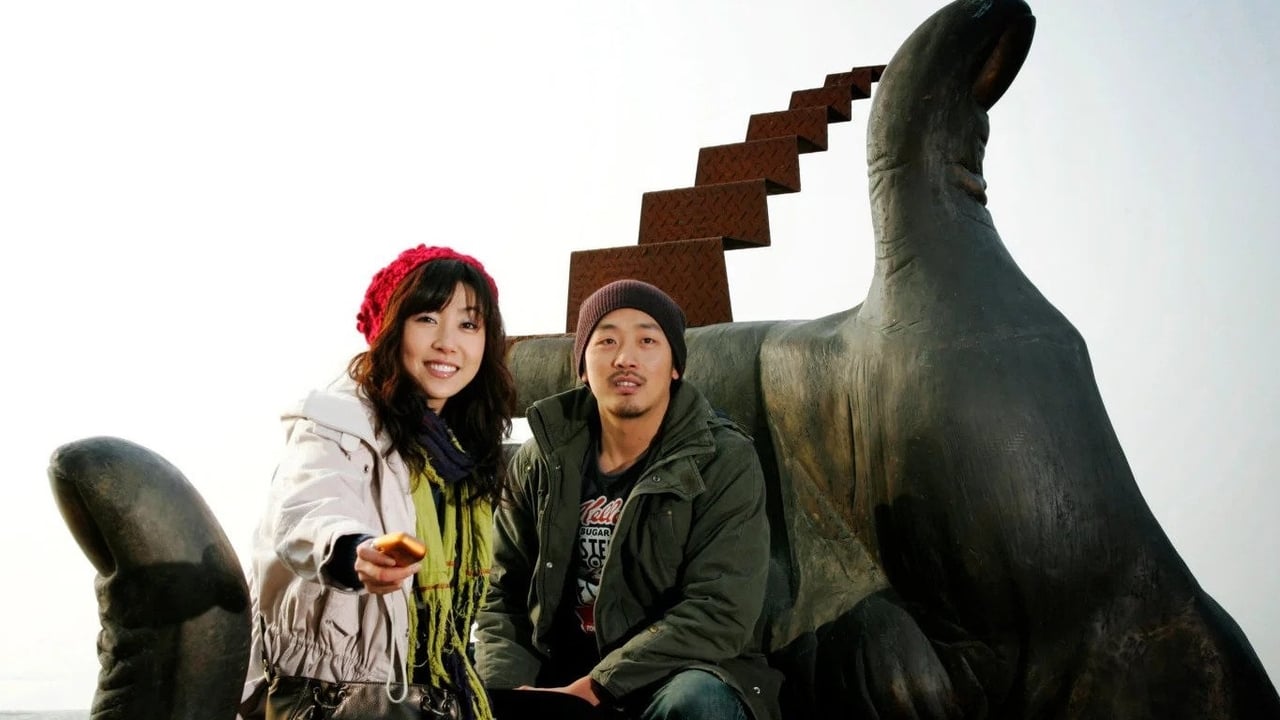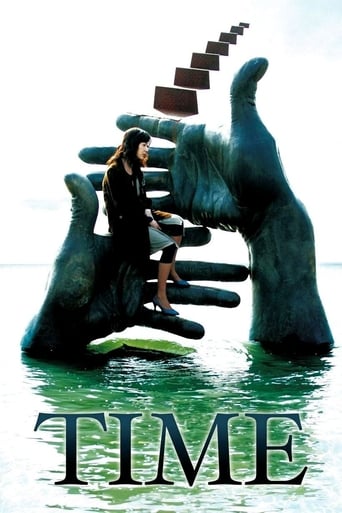

What keeps a relationship going? What makes us who we are? If we change our face, do we change our personality? These are some of the questions represented, and not necessarily answered, in this beautiful, surreal movie. The main female character, Seh-hee has been in a relationship with Ji-woo for two years and now fears he will leave her for someone else. Since she has low self esteem, she thinks she won't be able to keep him interested in her, especially in her looks. Her logic is that, over time, he will grow bored with her body, and so she takes desperate measures - she undergoes extreme plastic surgery.The movie director, Ki-duk Kim, comes from South Korea, which has the highest worldwide per capita rate of plastic surgery. Therefore, it's not difficult to perceive Time as a critique of this obsession. But the story isn't about what's outside. Seh-hee is jealous and difficult, and, ironically, ruins her relationship fearing it will end. Ji-woo loves her but still hasn't figured out how to behave in her presence, in order to keep her calm. If he even glances at another woman, Seh-hee will go crazy. This complicated relationship is told through aspects of identity, visual aestethics, natural behaviour, beauty and sexual commitment. It is astonishing how Time seems simple and multilayered at the same time. It may even take several views to capture every detail in and still you won't fully understand the story. The surrealist nature of some of its scenes may also be left open for interpretation.The downside to Time is that some people might find the story unbelievable. In this case, the story isn't that important, it's just a vehicle for delivering a certain message and developing certain topics like human connections, the hierarchy of needs one may have in a relationship and what is mutual affection based on in a relationship. Time, just like its topic, is from time to time a visually oriented movie. The cinematography is simple but beautiful, especially during the sculpture beach segments. It's hard to continue praising this movie without spoiling so we'll just end it here. Time is an obscure South Korean gem and a definite recommendation. Particularly if you like complicated movies that deal with unusual, simple but still everyday topics.Rating: 8/10
... View MoreHaving recently discovered Park Chan-wook's body of work I decided it was time to explore the work of another South Korean writer/director garnering similar acclaim. Kim Ki-duk has been hailed a maverick, labeled the "bad guy" of Korean cinema and his body of work has been described as brutal, graphic and unforgettable. As a result of the hype, my expectations were pretty high when I dipped my toes in Ki-duk's waters, first with 2004's 3- Iron and a few days later with 2006's Time. But, as it often is with high expectations, there's little space to soar and a long way to fall.While both films were technically astute and showcased flashes of poetic brilliance, my overall impression of Ki-duk is that he is a filmmaker who heavily relies on contrived plot lines, overt romanticism, melodrama, shock and surprise. Considering that Ki-duk has criticized his Korean contemporaries for being "too intellectual" it comes as no surprise his films owe more to Hollywood than the New Wave. Not surprising, the major problem with both 3-Iron and Time is that they aren't intellectual, are hollow and desperate to impress audiences.3-Iron is a film with little dialogue -- virtually none spoken by the two principals -- an unconventional approach to storytelling, one many of my favorite films adhere to. But sitting through 3-Iron I couldn't escape the feeling I was watching a self-conscious student film, one that isn't nearly as poignant as it wants to be. 3-Iron desperately wants to be interpreted as a serious work of cinema, exemplified by Ki-duk's deliberate efforts to manufacture curiosity by shrouding his main characters in ambiguous and mysterious behavior, all of which is framed in strictly composed wide shots and long takes. Unfortunately, this behavior is hard to connect with since it almost always feels unnatural, insincere and contrived; it feels like the voice of the writer is speaking to us, not the inhabitants within the story. In contrast, Chan-wook opts to challenge his audience with unorthodox editing and purposefully unconventional methods of storytelling, Ki-duk tells his story in very straight forward and conventional manner. The net result is that Ki-duk's characters always feel trapped within the realm of conventional storytelling and the eccentricities that animate their actions always feel manufactured by an authorial voice. As is often the case when movies try to capture the essence of "Love," they try too hard to be profound and naturalism ends up taking a back seat to something less desirable.A lot of people love 3-Iron because they see it as an unconventional love story. There's no question the subject matter owes more to Christopher Nolan's Following then it does to Anthony Minghella's The English Patient, so in that regard I suppose one has to concede 3-Iron isn't a typical romance film. But despite 3- Iron being determined to be different, the only thing it actually does any different from run- of-the-mill romance yarns is to portray unrealistic, eccentric and (ultimately) contrived behavior from the two lovers involved. Aside from this abnormal behavior, very few cinematic elements within 3-Iron can be considered unconventional. Despite the shortcomings of both 3-Iron and Time, I still think these are films worthy of modest amount of attention. At the very least, they are mindlessly engaging and at their best they are subtly indifferent to the formula that makes so many romantic films unbearable.
... View MoreThe title of the movie is an indication that the story happens under the sign of time and periods, same as in other of Ki-duk Kim's movies like the fabulous 'Spring, Summer, Autumn, Winter... and Spring'. Here the cycle lasts six months, the time it takes for a plastic surgery patient to completely recover and for his or her external appearance to change to the limit of not being recognized even by a lover. External appearance change means that the person changed? Can plastic surgery fool love? or destiny? To what extent what we are is how we look? This film of Kim is different in cinematography, it leaves almost completely the traditional Korea setting of other films of his and happens in the modern and futuristic Korean landscape, which even led some folks to shelve it as a science-fiction movie which it is not in my opinion. If some of the refined camera work from other movies is missing here the only exception is the statues park, where the characters come from time to time to take snapshots of themselves and of their physical changes. This very landscape which as the film progresses is more and more submerged in water, metaphor of another universe that is overtaking the reality. This universe is under water, invisible to us, like telling to not look for understanding and transparency in a world different than ours.This is also a love story, but a cruel one, and a different one. It all starts like a soap opera, a young couple breaks away, and she decides to play the cruel game of changing her appearance to test if his love can be triggered again if physically she becomes somebody else. It so happens that his was a true love, and when she shows up at the threshold of a six month cycle he is torn between the attraction for the new relationship and the feelings for the lost and disappeared true love. When truth surfaces he is the one who tries to take revenge, but the closing of the cycle turns into tragedy. Men - women relationships can never be symmetric.Some critics do not consider 'Shi gan' as one of Kim's best film. Well, if this is a relative failure I prefer Kim's failure to many other movies.
... View MoreTime is one of Kim KI Duk's more accessible offerings. No less beautiful or challenging than his earlier work, just a little more sympathetic to the viewers sense of "what's going on". The story centres around a couple, and more specifically the woman, who is definitely a little deficient in the self esteem department. Ji Woo and See Hee are a couple that have been in a steady relationship for some time, but things are getting a little stale, and cracks are beginning to appear between the two of them. As viewers we see the final breaking point in their local coffee shop.After flying into a jealous rage when Ji Woo innocently helps two girls who are having a little car trouble, thereby gaining their thanks and, albeit briefly their attention. Convinced that JI Woo is no longer in love with her, and probably seeking attention elsewhere, See Hee decides the only way to keep their relationship fresh, and her man interested is to give him a new woman to fall in love with...HERSELF! With that she disappears with no word or explanation, only to return six month later after extensive plastic surgery. Literally, a new woman. Meanwhile JI Woo is distraught, wondering where and why the love of his life has gone. Being left to wander dazed through the following days, weeks and months until, completely unaware what is in store for him, See Hees plan to reunite them is set into motion. However, when, after several carefully engineered meetings, she realises that her plan has badly backfired on her because, despite his obvious physical attraction towards her new creation (this new woman), he is still very much in love with his disappeared soul mate. She realises that the only way to stand any chance of getting him back is to tell him what she has done. How this is resolved, you will have to find out yourself... just remember you are watching a Kim Ki Duk movie. One reviewer made comment about the trend toward plastic surgery in Korea, however I feel that this is missing the point. This is not about needing a face lift or a boob job this is about losing yourself completely. Total reinvention, total lack of self esteem and self worth. This is not " he will like me better if my nose is straighter". This (more distressingly) is "he will like me better if I am someone else" !Forget the Korean connection, this is a sad love story about insecurity, jealousy, fidelity and faith. It could have been told in any country in any language. In fact this movie over any of his others I can see being ripe for the inevitable American remake treatment. All of the directors trademarks are here, the beautiful painterly images, the suppressed anger and brief explosive moments of violence, and of course the quiet lei-surly pace at which he allows the the story to unfold. Stylistically, imagine Greenaway shacked up with Haneke for the weekend, you will get the idea. Although I understand Kim Ki Duk is not really appreciated in his home country at the moment, I can only hope that with the passing of time (no pun intended) Korea realises that it can, and hopefully will, lay claim to one of the worlds true originals of modern cinema as it's own.
... View More